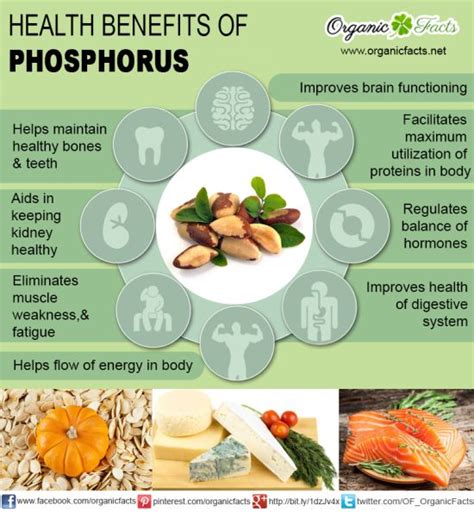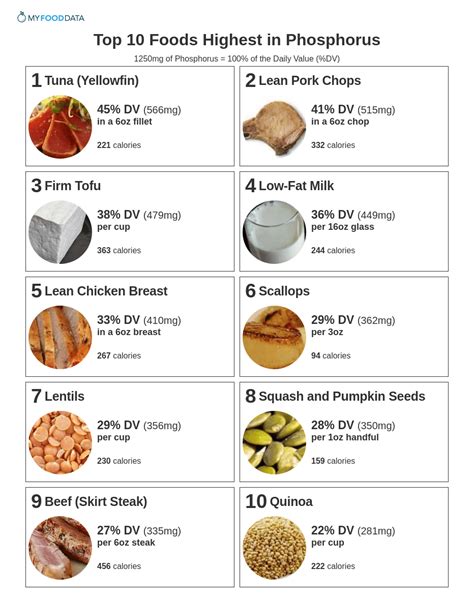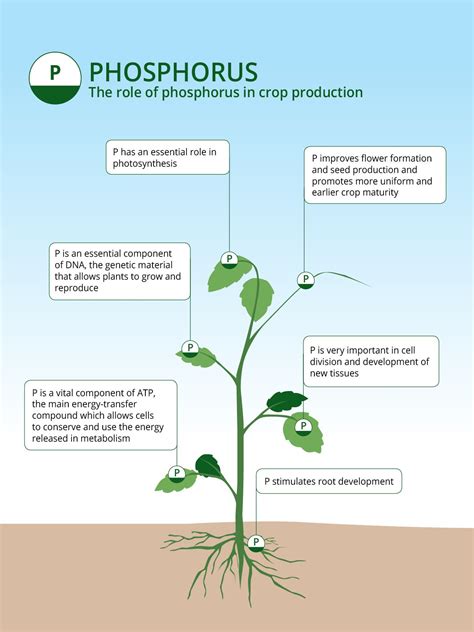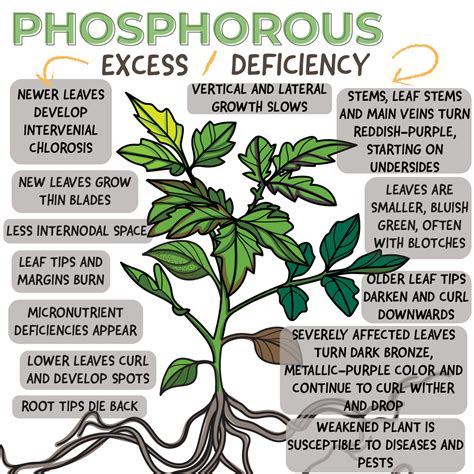Intro
Discover foods high in phosphorus, including meat, fish, and dairy, which support bone health, energy production, and nerve function, with related nutrients like protein, calcium, and vitamin D.
Phosphorus is an essential mineral that plays a crucial role in maintaining various bodily functions, including the formation of bones and teeth, the production of DNA and RNA, and the maintenance of healthy cells. It is also necessary for the proper functioning of the kidneys, nerves, and muscles. A diet rich in phosphorus can help to ensure that the body has sufficient amounts of this vital nutrient to perform these functions. In this article, we will explore the importance of phosphorus, its benefits, and the various food sources that are rich in this essential mineral.
The human body contains approximately 700 grams of phosphorus, with the majority of it found in the bones and teeth. Phosphorus is also present in smaller amounts in the blood, muscles, and other tissues. The body uses phosphorus to build and repair tissues, including bones, teeth, and cells. It is also necessary for the production of energy, as it is a key component of the molecule ATP (adenosine triphosphate), which is the primary energy currency of the body. A deficiency in phosphorus can lead to a range of health problems, including weakened bones, fatigue, and impaired cognitive function.
Phosphorus is widely available in a variety of foods, including meats, fish, dairy products, and plant-based foods. Foods that are high in protein, such as meats and fish, tend to be rich in phosphorus, as do foods that are high in calcium, such as dairy products. Plant-based foods, such as legumes, nuts, and seeds, are also good sources of phosphorus. In general, a balanced diet that includes a variety of whole foods can provide sufficient amounts of phosphorus to meet the body's needs.
Benefits of Phosphorus

Some of the key benefits of phosphorus include:
- Formation and maintenance of healthy bones and teeth
- Production of energy
- Maintenance of healthy cells, nerves, and muscles
- Support for kidney function
- Support for nerve function
- Maintenance of healthy skin, hair, and nails
Foods High in Phosphorus

Some of the richest sources of phosphorus include:
- Chicken liver: 1 cup cooked, 357mg
- Beef: 3 oz cooked, 231mg
- Fish: 3 oz cooked, 218mg
- Milk: 1 cup, 233mg
- Yogurt: 1 cup, 245mg
- Cheese: 1 oz, 200mg
- Almonds: 1 oz, 137mg
- Sunflower seeds: 1 oz, 117mg
Plant-Based Sources of Phosphorus

Some of the richest plant-based sources of phosphorus include:
- Lentils: 1 cup cooked, 356mg
- Chickpeas: 1 cup cooked, 274mg
- Black beans: 1 cup cooked, 241mg
- Almonds: 1 oz, 137mg
- Sunflower seeds: 1 oz, 117mg
- Quinoa: 1 cup cooked, 150mg
Phosphorus Deficiency

Some of the symptoms of phosphorus deficiency include:
- Weakened bones
- Fatigue
- Impaired cognitive function
- Muscle weakness
- Numbness or tingling in the hands and feet
- Abnormal heart rhythms
If left untreated, phosphorus deficiency can lead to more serious health problems, including osteoporosis, osteopenia, and rickets.
Treatment and Prevention of Phosphorus Deficiency

In some cases, supplementation may be necessary to treat phosphorus deficiency. Phosphorus supplements are available in a variety of forms, including capsules, tablets, and liquid solutions. It is essential to talk to a healthcare professional before taking any supplements, as they can interact with other medications and have side effects.
Some of the ways to prevent phosphorus deficiency include:
- Eating a balanced diet that includes a variety of whole foods
- Including phosphorus-rich foods in the diet, such as meats, fish, dairy products, and plant-based foods
- Avoiding foods that are high in phosphorus-binding agents, such as phytates and oxalates
- Staying hydrated by drinking plenty of water
- Getting regular exercise to support bone health
Interactions and Side Effects of Phosphorus

It is essential to talk to a healthcare professional before taking any supplements or making significant changes to the diet.
What are the symptoms of phosphorus deficiency?
+The symptoms of phosphorus deficiency include weakened bones, fatigue, impaired cognitive function, muscle weakness, numbness or tingling in the hands and feet, and abnormal heart rhythms.
What are the richest sources of phosphorus?
+The richest sources of phosphorus include chicken liver, beef, fish, milk, yogurt, cheese, almonds, sunflower seeds, and lentils.
Can phosphorus deficiency be treated with supplements?
+Yes, phosphorus deficiency can be treated with supplements. However, it is essential to talk to a healthcare professional before taking any supplements, as they can interact with other medications and have side effects.
In conclusion, phosphorus is an essential mineral that plays a crucial role in maintaining various bodily functions. A diet rich in phosphorus can help to ensure that the body has sufficient amounts of this vital nutrient to perform these functions. By including phosphorus-rich foods in the diet and being aware of the potential interactions and side effects, individuals can support their overall health and well-being. We invite you to share your thoughts and questions about phosphorus in the comments section below. Additionally, if you found this article informative, please share it with your friends and family to help them understand the importance of phosphorus in their diet.
